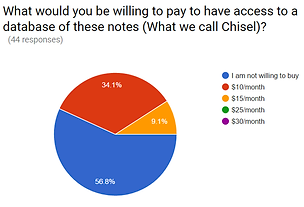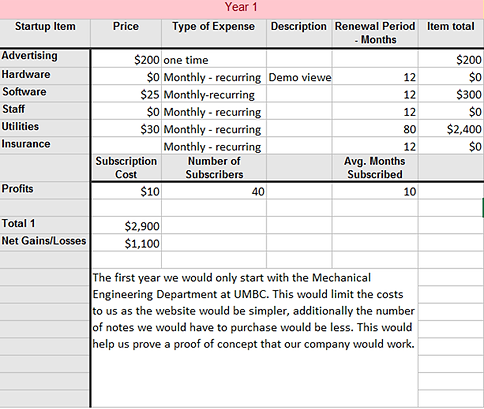

Entrepreneurship


The entrepreneurship minor at UMBC is defined as a gold experience and requires 18 credit hours total. Through classes like ENTR 200 and ENTR 201 I've gained great insight into startups, business, management, etc. One of the major drives for tools for scientific tools for discovery is investment. These technologies such as an ultra-small IR camera, are often expensive and for a specific niche. An entrepreneurial mindset is crucial to market the potential ideas as a product to attract investors or even use for contracts. If I want to run a lab as a professor while being at the interface between academia an industry to bring ideas and designs to market, I need to have some background in entrepreneurship which motivated me to take this minor (learning objective: communicating concise ideas).
On the attraction of investors side, Tesla is a prime example of bringing a fully electrical vehicle to market for the masses. Going from the roadster to the model s and then 3. For example, contracting to NASA for specific components like Orbital ATK does. They are able to build fantastic space and aero technologies but know the cost of actually putting a rocket into space. They use the niche of selling to NASA while still achieving their goals.
The market strategy has worked hand in hand with bringing their technology to market. In the class I did work do develop a small business proposal. It was called Chisel and it was a note sharing service, as cheating often runs rampant because students aren't able to learn. This business would create a notes bank for specific classes with specif professors at different institutions working as a host for a peer-driven system. (learning objective: apply to social problems). We designed a website, developed social media, created a budget proposal, and projected costs and income (learning objective: working effectively in teams). Additionally, we read the Lean Startup and did several presentations from new startups to old time super-companies which we analyze and predict where they can grow. At the end of the class we also sat in the seat of the investors to invest in the different companies everyone had developed (learning objective - recognizing opportunities/tools for risk assessment).
Through this experience, I learned a great deal of soft skills, specifically with presentations and making an impact. Our professor for ENTR 201, Mr. Gib Mason gave a great deal of life advice which I will carry on for the rest of my life. I will always remember in the words of Maya Angelou, "People may not remember exactly what you did, or what "you said, but they will always remember how you made them feel. "
Integrity - Throughout the Entrepreneurship minor we have studied cases of profits being put above people such as in the Volkswagen emissions scandal and the ford pinto recall. It is important to hold fast to the belief that people are valued over profits.
Perspectivism – One of the major decisions that is made in business is the applicability across markets. To understand your product well it is important to get diverse perspectives to input as this will educate people of how to both succeed in the market and not step upon others beliefs
Realistic vision – The entrepreneurship minor teaches students to dream big but know how to make those dreams a reality. Evinced through the Chisel Business plan seen below, a service/product must prove itself on a smaller subset of the population and then be continually adapted to the larger set to ensure what you want to accomplish is actually feasible (aka a prototype business)
Teamwork - Working and presenting in teams every week was taxing task in management as we were all different majors with different schedules and different skill sets.
Persistence - One of my team’s presentations was on practice and another on failure. Persistence is key. J.K Rowling would attempt 12 publishers for Harry Potter before someone took her book. The two go hand in hand as to practice we need to get things wrong often before we get them right. While we can learn from success we can learn even more from failure.
Flexibility – The lean startup is a required reading by ENTR 200 and gets to the heart of flexibility as you should have enough infrastructure to support an idea but be able to pivot if the return is not coming your way.
An entrepreneurship specific learning objective includes developing strategies for recognizing opportunities and identifying the tools for quality risk assessment. This is a key component of the minor and is practiced for the final projects as we are given some allotment of fake money to delegate to other students and this practiced the skill of risk assessment.



RESEARCH QUESTIONAIRE
CHISEL PROJECT
BUDGET PROJECTIONS



